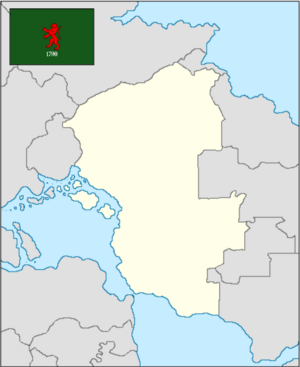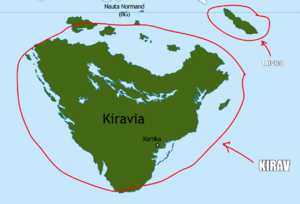World Guide: Difference between revisions
Takatta Loa (talk | contribs) |
|||
| Line 20: | Line 20: | ||
Long oriented toward the sea, Kiravians have engaged extensively in seaborne commerce, exploration, and colonisation, with the nation emerging as a major mercantile and colonial power during the Age of the Sail. Kiravian settlers populated much of what is now [[the Cape]] and [[Paulastra]], as well as various other territories such as [[Æonara]] and [[Suderavia]] that remain part of the Kiravian realm today. A relatively early entrant to {{wp|industrialism}}, Kiravia today has the second-largest national economy in terms of nominal GDP, underpinned by strong export-oriented industries such as electrical equipment, alcoholic beverages, and pharmaceuticals, as well as maritime trade and a burgeoning service sector. However, development and medium-term economic prospectus is uneven across the nation, with wide disparities in living standards and infrastructural quality between coastal and inland areas and metropolitan and non-metropolitan areas, and among the country's various cultural and geographic regions. | Long oriented toward the sea, Kiravians have engaged extensively in seaborne commerce, exploration, and colonisation, with the nation emerging as a major mercantile and colonial power during the Age of the Sail. Kiravian settlers populated much of what is now [[the Cape]] and [[Paulastra]], as well as various other territories such as [[Æonara]] and [[Suderavia]] that remain part of the Kiravian realm today. A relatively early entrant to {{wp|industrialism}}, Kiravia today has the second-largest national economy in terms of nominal GDP, underpinned by strong export-oriented industries such as electrical equipment, alcoholic beverages, and pharmaceuticals, as well as maritime trade and a burgeoning service sector. However, development and medium-term economic prospectus is uneven across the nation, with wide disparities in living standards and infrastructural quality between coastal and inland areas and metropolitan and non-metropolitan areas, and among the country's various cultural and geographic regions. | ||
Formally a federative {{wp|crowned republic}} under the sovereignty of the [[Marble Emperor]], the Kiravian political system is | Formally a federative {{wp|crowned republic}} under the sovereignty of the [[Marble Emperor]], the Kiravian political system is generally regarded as democratic, though at the federal level it has been subject to criticism from [[Occidental]] liberals for counter-majoritarian elements of its constitution, the strength of its {{wp|executive branch|executive}}, and a perceived {{wp|democratic deficit}}. | ||
Travellers may find it difficult to manage outside of relatively cosmopolitan port cities such as [[Valēka]], [[Saar-Silverda]], [[Béyasar]], [[Sirana]], [[Pontevedra]], and [[Cities of Kiravia#Sar-i-Pául|Sar-i-Pául]]. Comprehension of major international languages such as [[Caphiric Latin|Latin]] and [[Julian Ænglish|Ænglish]] outside of these urban centres ranges from unreliable to nonexistent, though [[Gaelic in Kiravia|speakers of Gaelic]] are reasonably common in many parts of the country. The challenges posed by a different script, [[Coscivian calendar|different timekeeping system]], [[Federalist system of units|different units of measure]], and an apparently wilful refusal to adopt many {{wp|Signage#Signage_conventions|informational signage conventions}} and international technical standards are compounded by alien social customs and a minefield of cultural taboos, the particularities of which can vary widely from locality to locality. The Office of Visitor Services strongly advises foreigners looking to experience the "real Kirav" to invest in an accredited guide or interpreter and a comprehensive guidebook. | Travellers may find it difficult to manage outside of relatively cosmopolitan port cities such as [[Valēka]], [[Saar-Silverda]], [[Béyasar]], [[Sirana]], [[Pontevedra]], and [[Cities of Kiravia#Sar-i-Pául|Sar-i-Pául]]. Comprehension of major international languages such as [[Caphiric Latin|Latin]] and [[Julian Ænglish|Ænglish]] outside of these urban centres ranges from unreliable to nonexistent, though [[Gaelic in Kiravia|speakers of Gaelic]] are reasonably common in many parts of the country. The challenges posed by a different script, [[Coscivian calendar|different timekeeping system]], [[Federalist system of units|different units of measure]], and an apparently wilful refusal to adopt many {{wp|Signage#Signage_conventions|informational signage conventions}} and international technical standards are compounded by alien social customs and a minefield of cultural taboos, the particularities of which can vary widely from locality to locality. The Office of Visitor Services strongly advises foreigners looking to experience the "real Kirav" to invest in an accredited guide or interpreter and a comprehensive guidebook. | ||
Revision as of 00:32, 7 June 2022
World Guide
Crona
South Crona

Confederated Provinces of Arcerion
Located in South Crona, the Confederated provinces of Arcerion are a parliamentary democracy with strong diplomatic ties to other members of its alliance, the Cronan Security and Trade Union. Founded by the Kingdom of Carna in the 1700s, Arcerion emerged as a settler state and a major agrarian and rail hub on the continent during the 1800s, of which much of that period was spent fighting the Bush Wars. As it entered into the modern era, it participated in both Great Wars, culminating with Operation Lightfoot, the invasion of The Cape during the 2nd Great War. Arcerion is a major exporter of staple foods and agricultural equipment, an homage to its deep-running cultural heritage as an agrarian democracy. It regularly participates in peacekeeping initiatives with other nations such as Paulastra, and regularly works with Stenza on military exercises in the Songun and Polynesian Seas. Arcerion is also a major diplomatic hub, with it being part of the short-lived South Crona Congress and participating as a member of the League of Nation's Security Council, assisting in multiple humanitarian initiatives. A keystone part of Arco foreign policy is the counter-piracy and counter-terror operations around the Malentine Sea to ensure freedom of maritime navigation and protecting commercial freight passing through the key Warrington Straits waterway. Progressive social policies and common-sense economic legislation make Arcerion one of the most stable democracies in Crona, regularly receiving international acclaim for its civil rights and safe cities.
The Federacy of the Cape
The Federacy of the Cape is an constitutional republic located on the southern point of Crona. Formed through a gruesome War of Independence against Kiravia and Cartadania, the Cape today is a multiracial and multilingual society with an Occidental, liberal, and modernist culture. It is one of the world's most vital transshipment hubs, and its Songun Straits are some of the busiest waterways in the world. Shaped roughly like a trident, the Cape is home to over 127 million people.
It is home to a variety of LONESCO world heritage sites and is heir to the rich history and culture of the indigenous Cahok peoples and the legacy of Kiravian and Cartadanian colonization. Besides from its cultural sites and bustling cities, the Cape is also known for its vast savannah, imposing mountain ranges, striking escarpments, and white beaches. The Cape is perhaps the favourite destination for Kiravian and Fanerian travellers, seeking a respite from the cold in a nation sharing cultural and economic ties.
While instances of crime and racial or sexual discrimination are few and far between, the prospective traveller should exercise caution nevertheless. The Cape is governed as an authoritarian democracy and a one-party state with limited judicial redress for certain crimes. One should refrain from insulting both republican institutions and the nation's founder, Melvyn Kalma, and his personality cult.
Kiroborea

Kiravian Federacy
Centred on an island continent between the Arctic and the Odoneru Ocean, the Kiravian Federacy is a civilisation-state known for its bizarre autochthonous culture, pervasive alcoholism, and miserable weather.
Long oriented toward the sea, Kiravians have engaged extensively in seaborne commerce, exploration, and colonisation, with the nation emerging as a major mercantile and colonial power during the Age of the Sail. Kiravian settlers populated much of what is now the Cape and Paulastra, as well as various other territories such as Æonara and Suderavia that remain part of the Kiravian realm today. A relatively early entrant to industrialism, Kiravia today has the second-largest national economy in terms of nominal GDP, underpinned by strong export-oriented industries such as electrical equipment, alcoholic beverages, and pharmaceuticals, as well as maritime trade and a burgeoning service sector. However, development and medium-term economic prospectus is uneven across the nation, with wide disparities in living standards and infrastructural quality between coastal and inland areas and metropolitan and non-metropolitan areas, and among the country's various cultural and geographic regions.
Formally a federative crowned republic under the sovereignty of the Marble Emperor, the Kiravian political system is generally regarded as democratic, though at the federal level it has been subject to criticism from Occidental liberals for counter-majoritarian elements of its constitution, the strength of its executive, and a perceived democratic deficit.
Travellers may find it difficult to manage outside of relatively cosmopolitan port cities such as Valēka, Saar-Silverda, Béyasar, Sirana, Pontevedra, and Sar-i-Pául. Comprehension of major international languages such as Latin and Ænglish outside of these urban centres ranges from unreliable to nonexistent, though speakers of Gaelic are reasonably common in many parts of the country. The challenges posed by a different script, different timekeeping system, different units of measure, and an apparently wilful refusal to adopt many informational signage conventions and international technical standards are compounded by alien social customs and a minefield of cultural taboos, the particularities of which can vary widely from locality to locality. The Office of Visitor Services strongly advises foreigners looking to experience the "real Kirav" to invest in an accredited guide or interpreter and a comprehensive guidebook.
Vallos
The Union of Takatta Loa
Based in the south of the tropical subcontinent of Vallos, west of Sarpedon, the Union of Takatta Loa is a loose federation of nine client nations widely known in the rest of the world for its diverse cultural complex and indigenous organized religion. The Loa people once formed a vast empire stretching almost all of Vallos and the Kindreds, but after the violent collapse of the imperial domain, the land that would become Takatta Loa would fall into chaos, with much if the northern territory being seized by Cartadania and the southwest being consolidated into modern day Takatta Loa.
Takatta Loa relies heavily on its natural resources, cheap manufacturing capacity and widespread shipping companies to sustain itself. The Union is the leading supplier of a great deal of the world's spices such as cardamom, nutmeg and Copium, although almost all of its other agriculture output remains domestic due to the relatively restrictive religious taboos in regards to pesticides. In addition, industrialism is becoming more and more prominent in Takatta Loa, with the nation producing increasingly more automobiles, electronics and trams, fueling economic growth. In addition, the state run companies that regulate entire industries in Takatta Loa are mandated on threat of death to focus on maximizing profit, which is distributed throughout the population as all citizens are employed by the state, whilst minimizing any and all severe changes to the traditional Loa way of life. Despite this, Takatta Loa is still a poor and developing nation, with certain regions relying entirely on subsistence agriculture.
Takatta Loa is also one of of most profoundly authoritarian nations in the world, though the power is diffused through a vast, byzantine bureaucracy and oligarchy rather then a single ruler or dynasty. All aspects of life are regulated and even the most basic activities such as leaving one's village requires a permit. In addition, the religious institutions of the Kapuhenasa maintain an iron tight grip on the population, combining theocratic zeal with ethno-nationalism and xenophobia specifically to enculturate an extremely caustic and isolationist attitude towards the Occident.
Currently, it is impossible to visit the Union of Takatta Loa as that requires a permit, which can only be acquired by Loa citizens. Furthermore, it is specifically outlawed to not be a Loa or of Loa descent and to not follow the teachings if the Kapuhenasa, locking away the many ancient wonders and customs of Takatta Loa from an outside visitor. However, one can visit the relatively modern and developed capital of Ninao under severe guidance and the watchful eye of the Loa military police.